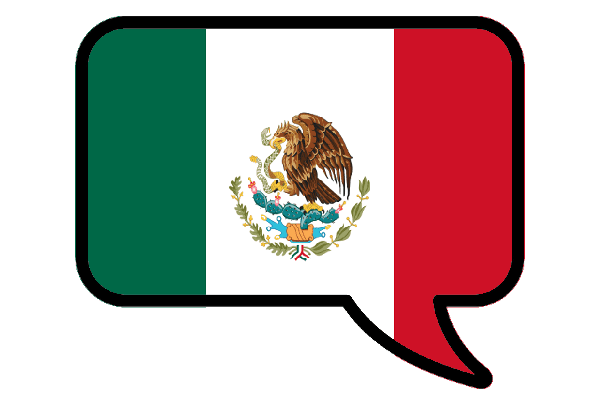¿Crees que en todo el mundo las palabras más usadas son las mismas? Puede ser que sí porque todo ser humano expresa situaciones humanas básicas la mayor parte del tiempo, pero indiscutiblemente cada cultura puede expresar lo mismo de maneras muy diferentes aunque hablemos el mismo idioma, es decir, las características únicas de cada nación hacen único también su lenguaje, por lo que la palabra tortilla pueda ser una constante en el habla mexicana de todos los días, mientras que en España la palabra tapa sea más recurrente. Pues bien, la cultura mexicana es muy ingeniosa y no solo tiene vocablos muy propios, sino que encima los transforma o bien les da significados nuevos.
Vamos a dar un paseo por una muestra de las palabras y expresiones más utilizadas en la vida cotidiana de los mexicanos y una breve definición según los profesores de español de IMAC Spanish Language Programs.
1.- Hola (Usual greeting)
2.- Adiós (Farewell)
3.- Casa (Place where people live)
4.- Trabajo (Place or occupation where people exchange an activity for money)
5.- Descanso (Rest period between an activity)
6.- Fiesta (meeting of several people with a cheerful tone. In Mexico usually with music)
7.- Cantón (Colloquial expression synonymous with home)
8.- Internet (A network of networks that allows decentralized interconnection of computers through a set of protocols called TCP / IP)
9.- Pachanga (Colloquial expression synonymous with party)
10.- El pedo (Variety of meanings depending on the context. Affair. Situation Drunk man, problem)
11.- Digo (When someone wants to make a correction, precede this word)
12.- La neta (Colloquial expression synonymous with the truth)
13.- Pinche (Negative adjective given to something or someone)
14.- Perro (In addition to being an animal, it is used as an insult or compliment depending on the context)
15.- Pa’ (Daddy or stop contraction)
16.- Ma’(Mother contraction)
17.- Mamá (Synonymous with mother)
18.- Padre (Synonymous with father)
19.- Chido (Positive adjective of informal use)
20.- Chile (Mexican fruit that causes burning and aggressively stimulates the taste buds)
21.- Tortillas (Thin corn or wheat pastry used for eating, even replaces the spoon)
22.- Rico (People with high economic status or an adjective synonymous with delicious)
23.- Carro (Car)
24.- Ok (Anglicism very common among Mexicans)
25.- Fútbol (11 vs 11 sport played with your feet)
26.- Carne (Edible animal tissue)
27.- Huevos (Chicken product)
28.- Chorizo (Meat sausage)
29.- Tamal (Mexican dish based on corn)
30.- Arre (Word to indicate advance to a horse and in colloquial Spanish means yes or we go)
31.- Camión (Means of high capacity land transport)
32.- Troca (Anglicism means pickup truck)
33.- Calle (Walk where cars pass in the city)
34.- Wey (Colloquial expression to indicate a person / or fool depending on the context)
35.- Híjole (Informal expression of admiration)
36.- Cuánto (Ask for quantity)
37.- Hijo (Breeding of humans)
38.- Jesús (Name of man, used in this case to evoke Christ)
39.- Dios (God of the Judeo-Christian religions)
40.- Ojalá (Expression of Arabic used to express desire)
41.- Virgencita (Mother of God, highly evoked in Mexican culture)
42.- Caguama (In central Mexico it means a 1 liter beer)
43.- Chela (Informal word for beer)
44.- Tomate (Common red fruit in salads)
45.- Jitomate (Means the same as tomato in the western region of Mexico)
46.- Televisión (Static screen to watch movies and series through a digital signal)
47.- Bien (In a good way)
48.- Mal (Unfavorably)
49.- Más o menos (A little or neither good nor bad)
50.- Tarde (Past time or period of the day from 1:00 p.m. to 7:00 p.m.)
51.- Café (Bitter grain drink)
52.- Pero (A word that indicates opposition)
53.- Caro (Adjective to express high price)
54.- Bueno (Adjective related to good)
55.- Bonito (Good looking)
56.- Barato (Adjective used to express low price)
57.- Taco (Mexican fast food consisting of tortilla and meat)
58.- Usted (Second person pronoun with respect)
59.- Mande (Friendly expression to show attention or ask to repeat)
60.- Oye (Call informally to ask for attention)
61.- órale (Colloquial expression of affirmation or hurrying someone. “That way”)
62.- ¿A poco? (Surprised expression)
63.- Este… (Catchphrase in the colloquial language. Signaling)
64.- ¿Qué onda? (Mexican colloquial greeting)
65.- Frijoles (Latin American food)
66.- o sea (Expression that means “that is to say.”)
67.- Es que (Expression that indicates justification or excuse)
68.- Porque (Expression of cause)
69.- ahí (Pointing out some point)
70.- Peso (Mexican coin)
71.- Gracias (Word of gratitude)
72.- Porfa (short expression of “please)
73.- Chiquito (Diminutive of boy)
74.- ¿ah sí? (Surprised expression)
75.- ándale (Expression to hurry someone)
76.- Así (Word that expresses mode)
77.- Por eso (Expression to express cause)
78.- A ver si… (Expression to indicate remote possibility)
79.- Con permiso (Excuse me)
80.- No cierto (Colloquial expression to deny)
81.- ¿Verdá? (Colloquial expression that means truth)
82.- También (Word that means concordance)
83.- fíjate (Indication to pay attention)
84.- Señorita (Young woman)
85.- Claro (Means of course)
86.- ¿eh? (Expression of non-understanding)
87.- Mira (Indication to see)
88.- Poquito (Diminutive of little)
89.- Salud (Expression when clinking glasses with alcohol)
90.- Ya ves (Expression to indicate that the other person understands or knows something)
91.- Cantinflear (Verb used to indicate that a person speaks a lot but says little)
92.- Bonche (Much)
93.- Cooperacha (Cooperation)
94.- Garigolear (Garnish excessively)
95.- Flojo (Lazy)
96.- Locochon (A bit crazy)
97.- Merequetengue (Disaster)
98.- Nel (Not)
99.- Quiubole (What’s up?)
100.-Teto (Fool)
¿Cuántas palabras de estas también son utilizadas en tu país? ¿Tienen expresiones diferentes a su lengua formal para expresar estas ideas? Posiblemente sí, tal vez incluso conozcas muchos conceptos diferentes a los que hemos enlistado pertenecientes a tu lengua y a tu específica cultura. Ahora, puedes salir a la calle a dar uso a todas estas nuevas palabras que has aprendido hoy.
Referencias:
Moreno Melissa (23,May,2016) 26 palabras que los mexicanos usamos a diario y la RAE no reconoce. El País. Recuperado de https://verne.elpais.com/verne/2016/05/06/mexico/1462493299_066380.html
